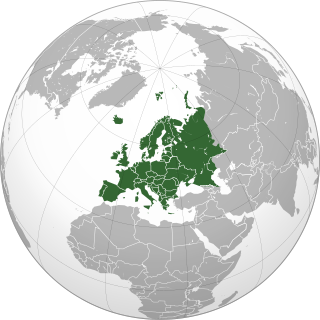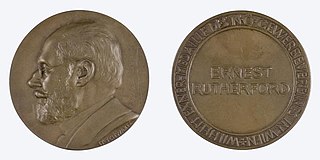
Asia is Earth's largest and most populous continent, located primarily in the Eastern and Northern Hemispheres. It shares the continental landmass of Eurasia with the continent of Europe and the continental landmass of Afro-Eurasia with both Europe and Africa. Asia covers an area of 44,579,000 square kilometres (17,212,000 sq mi), about 30% of Earth's total land area and 8.7% of the Earth's total surface area. The continent, which has long been home to the majority of the human population, was the site of many of the first civilizations. Asia is notable for not only its overall large size and population, but also dense and large settlements, as well as vast barely populated regions. Its 4.5 billion people constitute roughly 60% of the world's population, more than all other continents combined.

The BalkansBAWL-kənz, also known as the Balkan Peninsula, is a geographic area in Southeast Europe with various definitions and meanings, including geopolitical and historical. The region takes its name from the Balkan Mountains that stretch throughout the whole of Bulgaria from the Serbian–Bulgarian border to the Black Sea coast. The Balkan Peninsula is bordered by the Adriatic Sea in the northwest, the Ionian Sea in the southwest, the Aegean Sea in the south, the Turkish Straits in the east, and the Black Sea in the northeast. The northern border of the peninsula is variously defined. The highest point of the Balkans is Mount Musala, 2,925 metres (9,596 ft), in the Rila mountain range, Bulgaria.

Europe is a continent located entirely in the Northern Hemisphere and mostly in the Eastern Hemisphere. It comprises the westernmost part of Eurasia and is bordered by the Arctic Ocean to the north, the Atlantic Ocean to the west, the Mediterranean Sea to the south, and Asia to the east. The eastern border comprises a long and mixed line of mountain ranges and waterways that would normally define a subcontinent. However, Europe is generally accorded the status of a full continent because of its great physical size and the weight of history and tradition. It is the 6th largest continent in the world. Europe is commonly considered to be separated from Asia by the watershed divides of the Ural and Caucasus Mountains, the Ural River, the Caspian and Black Seas and the waterways of the Turkish Straits.

Greece, officially the Hellenic Republic, historically also known as Hellas, is a country located in Southeast Europe. Its population is approximately 10.7 million as of 2018; Athens, the nation's capital, is its largest city, followed by Thessaloniki.

Western Europe is the region comprising the western part of Europe. Though the term Western Europe is commonly used, there is no consensus on which countries comprise it.

Eastern Europe is the eastern part of the European continent. There is no consistent definition of the precise area it covers, partly because the term has a wide range of geopolitical, geographical, cultural, and socioeconomic connotations. There are "almost as many definitions of Eastern Europe as there are scholars of the region". A related United Nations paper adds that "every assessment of spatial identities is essentially a social and cultural construct". One definition describes Eastern Europe as a cultural entity: the region lying in Europe with the main characteristics consisting of Greek, Byzantine, Eastern Orthodox, Russian, and some Ottoman cultural influences. Another definition was created during the Cold War and used more or less synonymously with the term Eastern Bloc. A similar definition names the formerly communist European states outside the Soviet Union as Eastern Europe. Most historians and social scientists view such definitions as outdated or relegated, but they are still sometimes used for statistical purposes.

The Distinguished Flying Cross (DFC) is the third-level military decoration awarded to officers, and since 1993 to other ranks, of the United Kingdom's Royal Air Force and other services, and formerly to officers of other Commonwealth countries, for "an act or acts of valour, courage or devotion to duty whilst flying in active operations against the enemy".
Economic geography is the subfield of human geography which studies economic activity. It can also be considered a subfield or method in economics.

The George Cross (GC) is the second highest award of the United Kingdom honours system awarded "for acts of the greatest heroism or for most conspicuous courage in circumstance of extreme danger", not in the presence of the enemy, to members of the British armed forces and to British civilians. Posthumous awards have been allowed since it was instituted. It was previously awarded to residents of Commonwealth countries, most of which have since established their own honours systems and no longer recommend British honours. It may be awarded to a person of any military rank in any service and to civilians including police, emergency services and merchant seamen. Many of the awards have been personally presented by the British monarch to recipients or, in the case of posthumous awards, to next of kin. These investitures are usually held at Buckingham Palace.
(Ivan) Jean Gottmann was a French geographer who was best known for his seminal study on the urban region of the Northeast megalopolis. His main contributions to human geography were in the sub-fields of urban, political, economic, historical and regional geography. His regional specializations ranged from France and the Mediterranean to the United States, Israel, and Japan.

The American Geographical Society (AGS) is an organization of professional geographers, founded in 1851 in New York City. Most fellows of the society are Americans, but among them have always been a significant number of fellows from around the world. The Society encourages activities that expands geographical knowledge, and the interpretation of that knowledge so that it can be useful to geographers and other disciplines, especially in a policymaking environment. It is the oldest nationwide geographical organization in the United States. Over the century and a half of its existence, the AGS has been especially interested in three regions: the Arctic, the Antarctic, and Latin America. A signature characteristic of the AGS-sponsored exploration was the requirement that its expeditions produce tangible scientific results.
The Royal Canadian Geographical Society (RCGS) is a Canadian non-profit educational organization dedicated to imparting a broader knowledge and deeper appreciation of Canada—its people and places, its natural and cultural heritage and its environmental, social and economic challenges.

The Greek economic miracle is the period of sustained economic growth in Greece from 1950 to 1973. During this period, the Greek economy grew by an average of 7.7%, second in the world only to Japan.
The Victoria Medal is an award presented by the Royal Geographical Society. It is awarded "for conspicuous merit in research in geography" and has been given since 1902, in honour of the late Queen Victoria. Up until then, the society's Patron's Medal had alternatively been known as the "Victoria Medal", and the new medal resembled its original design.

North Macedonia, is a country in the Balkan Peninsula in Southeast Europe. It is one of the successor states of Yugoslavia, from which it declared independence in September 1991. A landlocked country, North Macedonia has borders with Kosovo to the northwest, Serbia to the northeast, Bulgaria to the east, Greece to the south, and Albania to the west. It constitutes approximately the northern third of the larger geographical region of Macedonia. The capital and largest city, Skopje, is home to roughly a quarter of the nation's 2.06 million inhabitants. The majority of the residents are ethnic Macedonians, a South Slavic people. Albanians form a significant minority at around 25%, followed by Turks, Romani, Serbs, Bosniaks, and Aromanians.

The George Davidson Medal is awarded by the American Geographical Society for the "exceptional achievement in research for exploration in the Pacific Ocean or the lands bordering therein." In 1946, the American Geographical Society received a bequest of $5000 from his daughter Ellinor Campbell Davidson to established the medal and a research fund to honor her father. The medal was designed by American sculptor Paul Manship in 1951.
The Cross of Valour is the second highest military decoration of the Greek state, awarded for acts of bravery or distinguished leadership on the field of battle. It has been instituted three times, first on 13 May 1913 during the Balkan Wars but not issued until 1921 during the Greco-Turkish War of 1919–1922, then on 11 November 1940 shortly after the outbreak of the Greco-Italian War and finally in 1974.

The Wilhelm Exner Medal has been awarded by the Austrian Industry Association, Österreichischer Gewerbeverein (ÖGV), for excellence in research and science since 1921.













